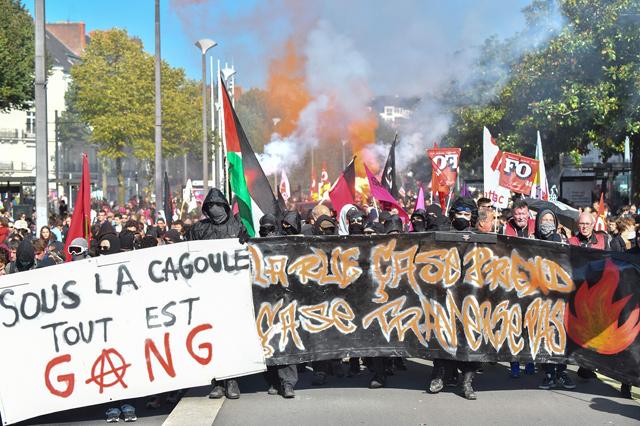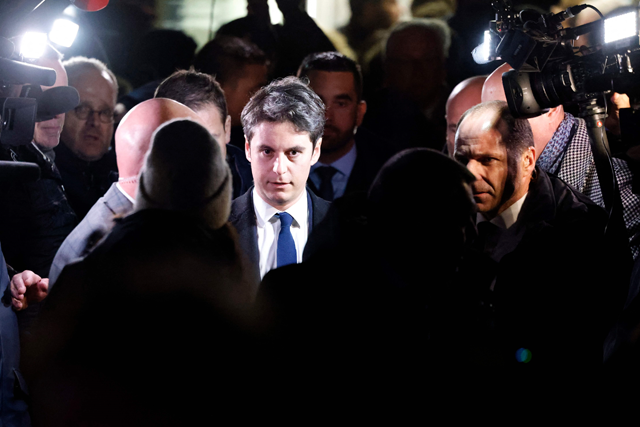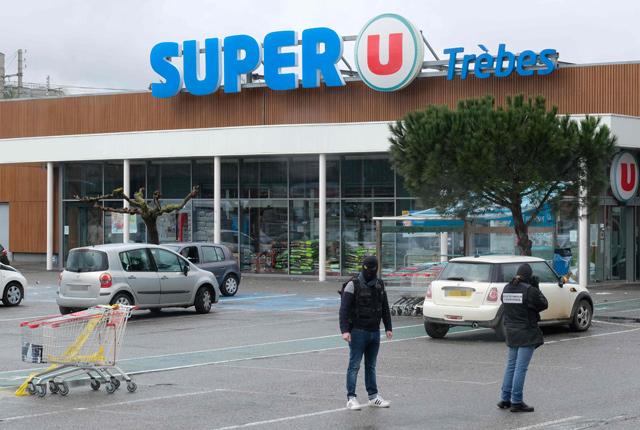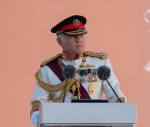You are here
Amid criticism, France’s Macron postpones Cabinet reshuffle
By Reuters - Oct 11,2018 - Last updated at Oct 11,2018

Protesters known as ‘black bloc’ hold a banner reading 'under the hood everything is gang' and 'you take the street, you don't cross it' during a one-day nationwide strike over President Emmanuel Macron's policies in Nantes, western France, on Tuesday (AFP photo)
PARIS — French President Emmanuel Macron put off a government reshuffle on Wednesday, raising new questions about the depth of political experience in his party and his own ability to keep his administration on track after several resignations.
The president and his prime minister have been weighing the reshuffle for a week following the departure of three ministers since late August, including interior minister and early Macron backer Gerard Collomb. The resignations have challenged the president's authority and stalled his reform ambitions.
Macron, 40, faces multiple challenges in carrying out a significant revamp. Not only must he try to maintain the left-right balance that he made a hallmark of his centrist movement, but also find strong candidates from among a relatively shallow and inexperienced pool of loyalists.
"The president wishes to take all the time necessary to draw up a team in a calm and professional way," the Elysee Palace said in a statement announcing the reshuffle's delay.
Government spokesman Benjamin Griveaux, a member of Macron's inner circle, denied the Macron administration was in disarray.
"There is no division in the government or the parliamentary majority on the political line we are pursuing," he said.
Ministers had been expecting the rejig before a cabinet meeting on Wednesday morning. But in the event, the Elysee said it would not happen until after Macron returns from a visit to Armenia late on Friday.
Macron's popularity has sunk in recent months as frustration has welled up over a leader many voters see as arrogant and the architect of policies that favour the wealthy.
Opponents branded the reshuffle a "tragi-comedy" that exposed a shortage of political experience in the ruling party.
Macron's Republique En Marche party, though, holds a commanding majority in the national assembly (lower house), his presidential term runs until 2022, and the opposition is divided, meaning he faces no immediate threat.
Prime Minister Edouard Philippe told baying opposition lawmakers there was "no anxiety, no restlessness" inside an administration committed to social and economic reform including an overhaul of the pension and unemployment benefit systems.
A senior Elysee official said the reshuffle process was taking longer than expected because Macron had redrawn the political landscape and brought in faces from outside politics.
"We're no longer in an age where because someone has 15 years of service under their belt they deserve to become a minister," the official said.
Diminished
pulling power
Macron's rivals are not convinced.
"Macron's ability to attract is pretty weak," hard left lawmaker Alexis Corbiere told BFM TV. "Many are asking themselves: 'What should we do in this mess?' They don't want to be finished politically by becoming a minister in a government that risks descending into crisis in less than a year."
In winning power in May 2017, Macron and his En Marche movement demolished France's traditional mainstream parties. He went on to poach senior politicians from both poles and draft in newcomers to build a government "neither of the right nor left".
But as the lustre has worn off his young presidency, and the impact of early reforms to the labour code and tax rules have, yet, to filter through, rivals have sought to depict an increasingly isolated figure with diminished star power.
"That they cannot replace the interior minister highlights chaos inside the Macron administration," said Valerie Boyer of the centre-right Les Republicains party. "Either there's a lack of names or a lack of candidates in whom the president can trust and who will stay loyal to his programme."
While Macron doesn't face reelection until 2022, European Parliament elections in May next year and municipal voting in France in 2020 could turn into a semi-referendum on his mid-term performance.
Particularly damaging to Macron in recent weeks were comments made by ex-interior minister Collomb. An early convert to Macronism, Collomb said the president and his team "lacked humility" and warned of hubris - a viewpoint which opinion polls show is shared by many voters.
"The issue here is not the government but the president, a president who is seen by French people as someone who doesn't listen to them, and even belittles them," said Jean-Daniel Levy of pollster Harris Interactive.
Related Articles
PARIS — French leader Emmanuel Macron on Tuesday picked Gabriel Attal as prime minister in a bid to give new momentum to his presidency, wit
PARIS — French President Emmanuel Macron on Monday reshuffled his government looking to reset a second term off to a rocky start after his f
TREBES, France — A French policeman who offered himself as a hostage to help end what President Emmanuel Macron branded an "Islamist terrori

















